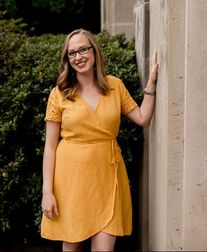 Q: Tell us about how you first became involved in music I have been singing for as long as I can remember! As a young child, I would constantly sing Disney songs around the house (and I still know every word!) I formally joined a choir when I was in elementary school, and continued through college. I was a member of an all girls acapella group at J.J. Pearce High School, which was a high school highlight for me. I studied piano for about 4-5 years in elementary school, then gave it up for other activities (oh how I wish I didn’t!). I began dabbling in piano again in high school, learning pieces on and off on my own. Q: Is anyone else in your family a musician? Yes! My father played the trombone and drums when he was growing up, and my sister was a wonderful pianist throughout her elementary and middle school years. My cousin studied voice at Vanderbilt and is very involved with her church choir. Another cousin plays a pretty mean electric guitar, and my husband plays several instruments as well. I guess you could say music is pretty important in my family! Q: Growing up, did you have any influential teachers/professors who guided you towards becoming a professional musician? I had a couple of influential professors at SMU- the first would be Dr. Gary Foster. He was my music theory professor and had so much patience with me. Entering college, I had very little music theory knowledge. He would meet me outside of class for tutoring quite often and really started from the ground up with me. The second professor was Dr. Robert Krout, who was my music therapy professor. He is so well-respected in the music therapy community worldwide and I learned so much from him. He is still someone I look up to as a role model! Q: What is your personal teaching philosophy? I am an avid proponent that anyone, even adults, can learn an instrument if they are willing to work hard and have patience. I often think about how I was as a piano student- I was not really a perfect student and often hated practicing. Learning new piano repertoire is still a lot of effort for me to this day, so I think I understand my students’ struggles and I know how to help them overcome obstacles because of my own experiences. I think music can bring so much joy to life, and I love sharing that gift. I try to create “marathon runner” students instead of “sprinters”, and I think frequent communication with parents is absolutely essential in their success. Q: You have bachelor’s degrees in Music Therapy and Psychology from SMU. What was the best thing you’ve learned during your studies there? I think there is some overlap between teaching, music therapy, and psychology, especially in the way I approach and work with my students. I look at each student holistically- what’s going on at school, family dynamics, other activities that they participate in, etc. I think all factors can play a part in how well they are doing in their musical studies. I also have a couple of students with learning disabilities, so what I learned at SMU is valuable in helping them to be successful at the piano. Q: What is your favorite music genre? Like most people I have several, it all just depends on my mood! I listen to acoustic singer/songwriter, jazz, classical, country/bluegrass, and pop most of the time. Q: What is your favorite part about being a piano teacher? I think building relationships with my students is the best part. In school, students change teachers every year, but as a private music teacher, you get to watch them grow and celebrate their successes with them along the way. The bond between the student and music teacher is often very strong because it’s a rare type of relationship. It feels as if my students and their families become part of my family over the years. Q: You teach both voice and piano- do you prefer one over the other? I think piano and voice go very much hand in hand- knowledge of one is so helpful for the other. For the students who study both with me, it’s fun to watch them have “ah-ha” moments when they discover something they learned in one instrument that can apply to the other, particularly when it comes to ear training and theory. I think it’s a great opportunity for them to learn their strengths and weaknesses as a musician when they study two different instruments. Q: When you are not teaching, what do you like to do in your spare time? I love spending time with my family- my parents live very close to me. I’ve also been seriously practicing yoga for a little over a year, and I absolutely love it- I learn to be more present and practice mindfulness. I also love to bake, although I only do it for special occasions. And of course, there is always practicing to be done! For more on Meredith, click here
0 Comments
Your comment will be posted after it is approved.
Leave a Reply. |
Archives
July 2024
Categories
All
|
|
|
MUSIC SO SIMPLE
|
 RSS Feed
RSS Feed